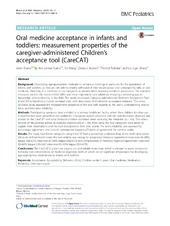| dc.contributor.author | Blume, Joern | en_US |
| dc.contributor.author | Ruano, Ana Lorena | en_US |
| dc.contributor.author | Wang, Siri | en_US |
| dc.contributor.author | Jackson, Debra J. | en_US |
| dc.contributor.author | Tylleskär, Thorkild | en_US |
| dc.contributor.author | Strand, Liv Inger | en_US |
| dc.date.accessioned | 2019-05-27T11:50:01Z | |
| dc.date.available | 2019-05-27T11:50:01Z | |
| dc.date.issued | 2018-03-22 | |
| dc.Published | Blume J, Ruano AL, Wang S, Jackson DJ, Tylleskär T, Strand LI. Oral medicine acceptance in infants and toddlers: measurement properties of the caregiver-administered Children's acceptance tool (CareCAT). BMC Pediatrics. 2018;18:117 | eng |
| dc.identifier.issn | 1471-2431 | |
| dc.identifier.uri | https://hdl.handle.net/1956/19724 | |
| dc.description.abstract | Background: Developing age-appropriate medications remains a challenge in particular for the population of infants and toddlers, as they are not able to reliably self-report if they would accept and consequently take an oral medicine. Therefore, it is common to use caregivers as proxies when assessing medicine acceptance. The outcome measures used in this research field differ and most importantly lack validation, implying a persisting gap in knowledge and controversy in the field. The newly developed Caregiver-administered Children’s Acceptance Tool (CareCAT) is based on a 5-point nominal scale, with descriptors of medication acceptance behavior. This crosssectional study assessed the measurement properties of the tool with regards to the user’s understanding and its intra- and inter-rater reliability. Methods: Participating caregivers were enrolled at a primary healthcare facility where their children (median age 6 months) had been prescribed oral antibiotics. Caregivers, trained observers and the tool developer observed and scored on the CareCAT tool what behavior children exhibited when receiving the medicine (n = 104). The videorecords of this process served as replicate observations (n = 69). After using the tool caregivers were asked to explain their observations and the tool descriptors in their own words. The tool’s reliability was assessed by percentage agreement and Cohen’s unweighted kappa coefficients of agreement for nominal scales. Results: The study found that caregivers using CareCAT had a satisfactory understanding of the tool’s descriptors. Using its dichotomized scores the tool reliably was strong for acceptance behavior (agreement inter-rater 84–88%, kappa 0.66–0.76; intra-rater 87–89%, kappa 0.68–0.72) and completeness of medicine ingestion (agreement inter-rater 82–86%, kappa 0.59–0.67; intra-rater 85–93%, kappa 0.50–0.70). Conclusions: The CareCAT is a low-cost, easy-to-use and reliable instrument, which is relevant to assess acceptance behavior and completeness of medicine ingestion, both of which are of significant importance for developing age-appropriate medications in infants and toddlers. | en_US |
| dc.language.iso | eng | eng |
| dc.publisher | BioMed Central | eng |
| dc.rights | Attribution CC BY | eng |
| dc.rights.uri | http://creativecommons.org/licenses/by/4.0 | eng |
| dc.subject | Acceptance | eng |
| dc.subject | Acceptability | eng |
| dc.subject | Behavior | eng |
| dc.subject | Child | eng |
| dc.subject | Children under 5 years | eng |
| dc.subject | Oral medicine | eng |
| dc.subject | Medication | eng |
| dc.subject | Reliability | eng |
| dc.subject | Informant-report | eng |
| dc.title | Oral medicine acceptance in infants and toddlers: measurement properties of the caregiver-administered Children's acceptance tool (CareCAT) | en_US |
| dc.type | Peer reviewed | |
| dc.type | Journal article | |
| dc.date.updated | 2019-01-10T08:53:07Z | |
| dc.description.version | publishedVersion | en_US |
| dc.rights.holder | Copyright 2018 The Author(s) | |
| dc.identifier.doi | https://doi.org/10.1186/s12887-018-1080-4 | |
| dc.identifier.cristin | 1627093 | |
| dc.source.journal | BMC Pediatrics | |

